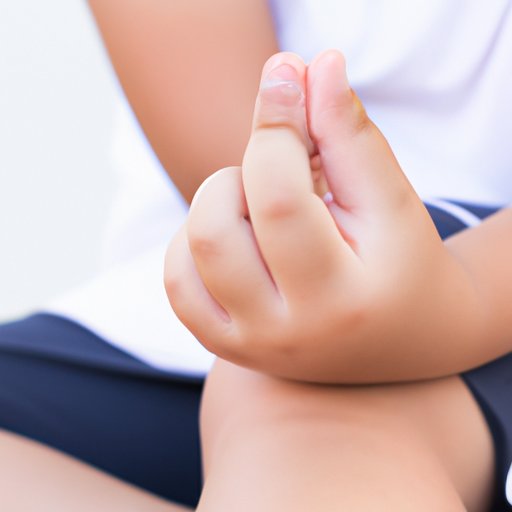
Introduction
Hand Foot and Mouth Disease (HFMD) is a common viral infection that affects both children and adults. It is characterized by a fever, sore throat, and a rash on the hands, feet, and mouth. While the symptoms may be uncomfortable, HFMD is rarely serious and typically resolves on its own within a week or two. However, it is important to be knowledgeable about HFMD to prevent its spread and to seek prompt medical attention if necessary. This article provides a comprehensive guide to understanding HFMD, including its causes, symptoms, and treatments.
A Comprehensive Guide to Understanding Hand Foot and Mouth Disease
HFMD is a viral infection that is caused by Enteroviruses, primarily Coxsackievirus A16 and Enterovirus 71. These viruses are easily transmitted from person to person through contact with an infected person’s saliva, mucus, feces, or blister fluid.
Populations at risk for HFMD include young children under the age of 5, although adults can also get HFMD. The infection is more common during the summer and fall months.
Exploring the Causes, Symptoms, and Treatments of Hand Foot and Mouth Disease
The symptoms of HFMD typically begin with a fever, sore throat, and feeling unwell. These symptoms may be followed by the development of small, painful sores in the mouth, on the hands, and on the feet. These sores may also appear as bumps or blisters and can be itchy or painful.
While there is no specific treatment for HFMD, over-the-counter medications like acetaminophen or ibuprofen can help relieve symptoms such as fever and pain. Drinking fluids or eating foods that are cold or soft can also help soothe the mouth sores. In most cases, the illness will resolve on its own within a week or two.
Prevention methods for both adults and children include regular hand washing, avoiding close contact with infected individuals, and disinfecting objects and surfaces that may be contaminated with the virus.
Everything You Need to Know About Hand Foot and Mouth Disease in Children and Adults
While the symptoms of HFMD are generally similar in both children and adults, the illness can affect children differently. Children may experience a higher fever and more severe rashes than adults. In addition, children may also be at risk for dehydration due to difficulty swallowing and other symptoms.
In most cases, treatment for HFMD will be the same for both children and adults. However, it is important to closely monitor children and seek medical attention if they become dehydrated or develop any complications, such as infections or neurological problems.
What Parents Need to Know About Hand Foot and Mouth Disease in Children
HFMD is easily spread among children in child care settings and schools, so it is important for parents to be aware of the symptoms and to take steps to prevent its spread. Children should be kept home from school or daycare if they have a fever or rash. Parents can also encourage regular hand washing and teach their children to avoid sharing utensils or toys with others.
If your child develops HFMD, treatment options may include over-the-counter medications for fever and pain, as well as non-irritating liquids or foods to help soothe mouth sores. It is important to contact your child’s healthcare provider if they develop a high fever or difficulty swallowing.
Hand Foot and Mouth Disease: Myths vs Facts
There are several myths surrounding HFMD, including the belief that it only affects children or that it can be cured with antibiotics. However, HFMD can affect anyone, and antibiotics are not effective against viral infections like HFMD.
The best way to prevent HFMD is through proper hygiene practices, such as regular hand washing and disinfection of objects and surfaces that may be contaminated. If you or your child develops symptoms of HFMD, it is important to seek prompt medical attention to manage symptoms and prevent complications.
Conclusion
HFMD is a common viral infection that can affect both children and adults. While the symptoms may be uncomfortable, the illness is generally not serious and can be managed with over-the-counter medications and self-care measures. However, it is important to be knowledgeable about HFMD to prevent its spread and to seek medical attention if necessary. By following proper hygiene practices and staying informed about the causes, symptoms, and treatments of HFMD, you can help protect yourself and your loved ones from this illness.





